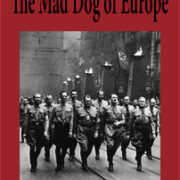The Mad Dog of Europe by Herman J. Mankiewicz and Albert Nesor
Download an epub file for your Android or Apple device:
Download a mobi file for your Amazon device:
From a review of the print edition on Amazon:
While I have read other books about Hitler and WWII, I was drawn to read “The Mad Dog of Europe” by Albert Nesor because of its publication date – 1939. The story drew heavily on first hand accounts of immigrants who had recently left Germany. I was curious to know how prescient the Germans were about Hitler’s intentions. While Nesor gives a detailed account of how and when Hitler took over the country, the main narrative focuses on a circle of friends in the small Bavarian town of Gronau. They had lost sons in WW1 and the ones that did return were disillusioned and struggling to find work. The names of the people and the town were changed because in 1939 it was, of course, very dangerous to make negative remarks about the Reich. There actually is a town in Germany named Gronau but it is way to the north of Bavaria.
Among the book I have read about Hitler, Nestor’s account was the most graphically negative. Hitler is shown to work toward his goal of saving Germany from “Jewish Communism” with obsessive intensity. In his tirades against communism Hitler made me think of Senator Joseph McCarthy on steroids. Both also targeted and persecuted homosexuals. Fortunately McCarthy’s means were more limited. Hitler had a private army during the 30’s of well over a million ruthless men that he used frequently in the streets. The Nazi’s anti-communism was generally supported not only by many Germans, but also by people in other countries and many people in the United States. It was a major platform for his rise to power. When Hitler became Chancellor his political opponents were sent to concentration camps. When I lived in Bavaria (1979 ) my somewhat older neighbor said she would never have anything to do with politics because her father died in a concentration camp for being a communist. With my limited German vocabulary of two thousand words, all I could say was “Hitler war ein Teufel”.
Nestor’s characters were not prescient about Hitler until it was too late. Like us they went about their daily lives even though they did not approve of what they read in the papers. After the Nazis took over everyone in Gronau was terrified. Even high ranking Nazi party officials had saved foreign currency, exit visas and money in American banks in case of a Teutonic armageddon which they vaguely felt might come but did not perceive when or how. In the end the main character of the novel holds off the Nazi storm troopers with a pistol while his brother tries to escape across the border. He has the sentimental hope that Germans will regroup in America and then save his beloved country from Hitler. As we now know it was Hitler’s declaration of War on the USA that forced a response. Not Germans but German-Americans – Dwight Eisenhower, Chester Nimitz, Carl Spaatz – led the troops against Hitler. German immigrants did provide valuable service as translators and as spies.




Leave a Reply
Want to join the discussion?Feel free to contribute!